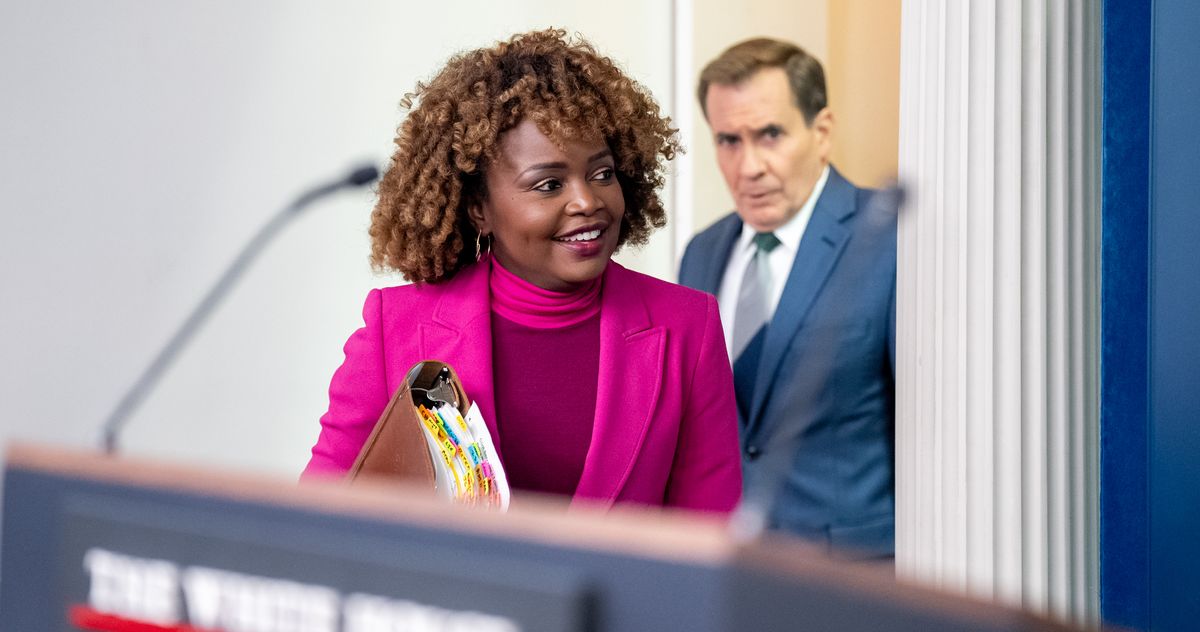
White House press secretary Karine Jean-Pierre arrives for a news conference in 2024.
Photo: Andrew Harnik/Getty Images
The girlboss is dead, or so I thought. She belonged to a brief moment in a longer struggle over women and our suitability for life outside the home. Now the home might swallow us up: The right wing dreads “the longhouse,” ruled by women and their “weepy moralism,” or “the great feminization” of society. The girlboss had begun to look quaint by the time I picked up Karine Jean-Pierre’s new book, Independent: A Look Inside a Broken White House, Outside the Party Lines. She is best known as Joe Biden’s former White House press secretary, the first Black and openly LGBTQ+ person in the role, and she earned some attention earlier this year when she announced she was leaving the Democratic Party to become — don’t hold your breath — an independent. The memoir is short, which is a mercy. Reading it made me wonder if I’d consumed a life-altering quantity of Benadryl and hallucinated a trip back in time. She writes as if the year is still 2014 and a woman’s professional accomplishments outweigh moral considerations. The girlboss lives after all.
A review in the Washington Post called Jean-Pierre an “artifact of an age that looks recent on paper but feels prehistoric in practice,” defined by “the word ‘empowerment,’ the musical ‘Hamilton,’ the cheap therapeutic entreaties to ‘work on yourself’ and ‘lean in’ to various corporate abysses.” Indeed, the phrase self-care appears in the book, though not in jest. There’s little independence on display, either, as she devotes page after page to the magnanimity and sharp instincts of Biden. The girlboss might lean in, self-advocate, [insert cliché here], but she works within the system, not outside it. The same goes for Jean-Pierre, whatever her subtitle suggests. Instead, she’s still doing the job that Biden once paid her to do — and poorly. The Biden we all saw during his catastrophic debate with Donald Trump did not exist. She says he simply had a cold. She believed in him, though I’m still not sure why. She writes, incessantly, of her own feelings and comfort, or the lack thereof. During the Democratic National Convention, Jean-Pierre turned off the TV “and nestled against the cushions of my living room couch.” (Must have been nice.) The White House press corps was too mean to Biden — but not nearly as mean as it was to Jean-Pierre, who berates reporters for publishing “jabs” and “thoughtless gossip” about the quality of her work.
Sometimes she looks away from her mirror to consider the rest of the world. This produces a few trenchant observations, like “It was during Covid, a bizarre as well as historic moment,” and “In this political moment, we need to find ways to maintain our individuality even as we build coalitions.” Good talk, thanks. Elsewhere, she recalls the uprisings of 2020, which followed the police murder of George Floyd and launched “a vigorous conversation about being antiracist” with books like “White Fragility by Robin DiAngelo gaining in popularity.” Dinosaurs walk the earth, but how dangerous are they? Biden is no longer in power, and neither is Jean-Pierre. Independent is more of an audition to co-host The View than a serious analysis of the Democratic Party and its troubles, and it fails on both counts. Still, it’s hard to dismiss Jean-Pierre, if only for what she represents. The girlboss has always been more than an empty pantsuit.
When Sheryl Sandberg published Lean In in 2013, she sought “to redefine what revolution means,” the ex–Facebook employee Kate Losse wrote in Dissent magazine. If feminist goals were once understood as the end point of a collective struggle to restructure society itself, Sandberg offered something else. In Lean In, revolution was “a battle to restructure the self,” Losse argued. Sandberg is hardly the sole — or even the most important — architect of our present woes, but she is a useful study. The writer Susan Faludi observed “little tangible cross-class solidarity” from Sandberg and her ilk, who preferred instead to contemplate themselves or, more rarely, women of similar status. When Margaret Thatcher died — and left a trail of misery behind her corpse — the official Lean In Facebook page asked followers to post their warmest memories of her career, Faludi wrote. Thatcher had clawed her way to the top, and that mattered more than anything else she’d done. In Independent, Jean-Pierre credits Thatcher for wielding “power with such force that she was dubbed the ‘Iron Lady’” and honors her alongside Golda Meir, the former prime minister of Israel, who expanded illegal settlements and said that Palestinians “did not exist” at the founding of her nation.
If strong female leadership is valuable in its own right, individual success takes precedence over the public good. Independent has something in common with PragerU’s Women of Valor, a children’s book that celebrates the history-making achievements of Thatcher’s and Meir’s, whether Jean-Pierre intends this or not. The girlboss has priorities, but they are centered on herself; her compass always points inward. Jean-Pierre was the voice of the U.S. government, a responsibility she demotes to a form of self-actualization. She exempts herself from introspection and regret. Did Biden, the hero, get anything wrong? Did she? Israeli forces killed thousands of Palestinians with arms that Biden sold them, but Jean-Pierre never questions him or admits her complicity. The genocide in Gaza is some “terrible conflict.” Biden announced a temporary cease-fire toward the end of his presidency. End scene. “It was a whirlwind, leaving me little time to reflect about endings or beginnings, whether they were Biden’s or my own,” she writes.
I then recalled a BuzzFeed News listicle that still haunts me. Midway through the first Trump term, an illustrator in Brooklyn created a series of prints that depict “impactful women through history having their period,” as BuzzFeed put it. Sacagawea’s naked rear hovered over a shrub. Joan of Arc sat on a wooden board with a hole in it. Ruth Bader Ginsburg was perched on a toilet, still in her robes. The point, allegedly, was to celebrate #MightyMenstruation and the power of women, who get shit done while bleeding once a month. We could have it all, a legal career and a regular cycle, the dreams of our foremothers realized at last. The message was a little archaic even in 2018. The age of the girlboss was already synonymous with surrender, and a menacing era for American women had gotten underway. Ginsburg bore some of the blame. Two years after that listicle, she died on the bench and gave Trump a prized opportunity to replace her with Amy Coney Barrett. Roe v. Wade did not last much longer.
The girlboss was cringe — and dangerous, too. Underneath the kitsch, she’s a mercenary, and she persists because of powerful incentives for her behavior. Jean-Pierre is right: The Democratic Party is broken. But she’d have to look beyond herself in order to tell us why. “Being independent means refusing to silence your voice just so you can belong,” she concludes. Our voices carry further when we have something of substance to say. Otherwise, we’re just making noise.

